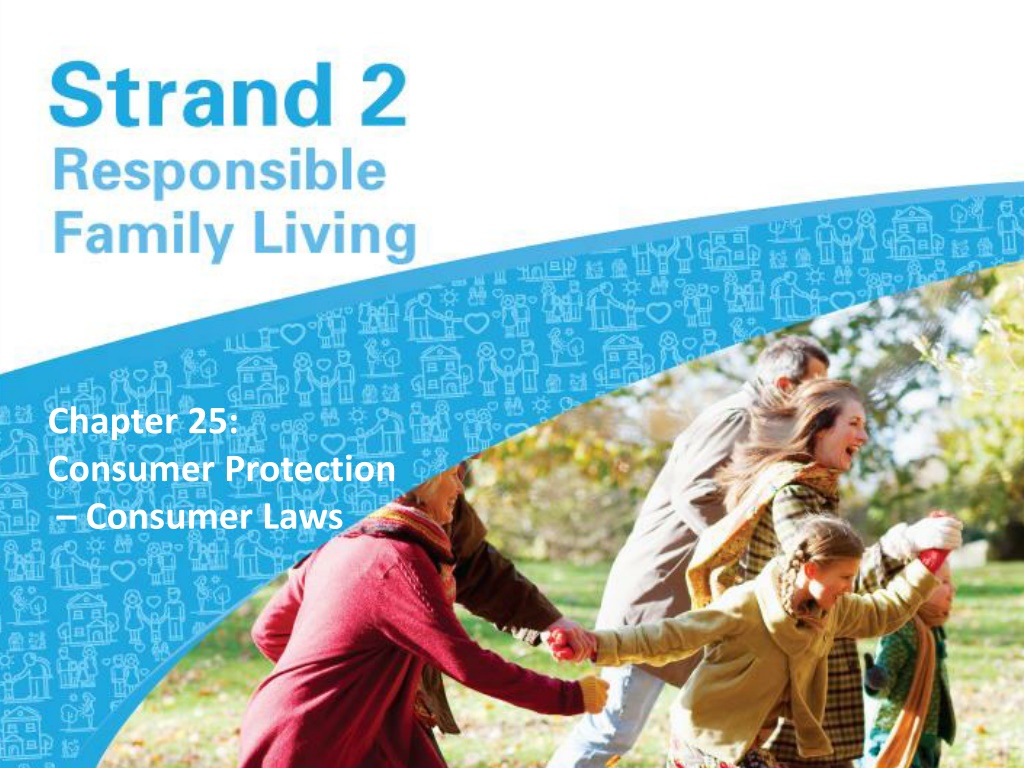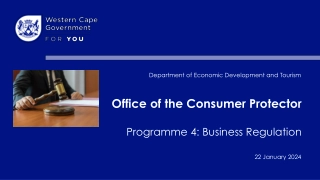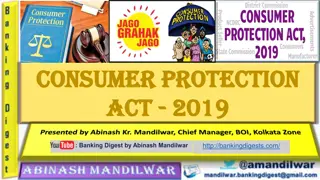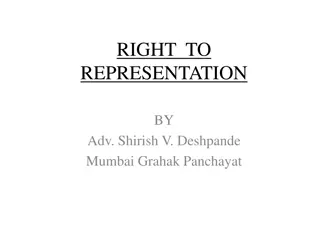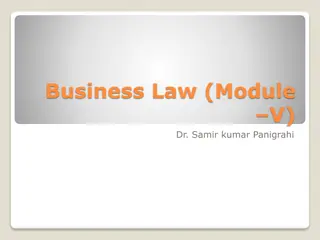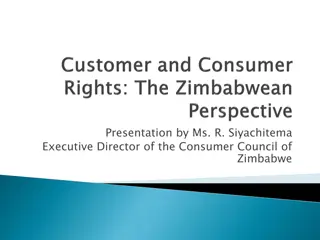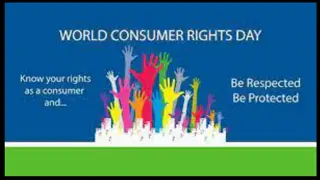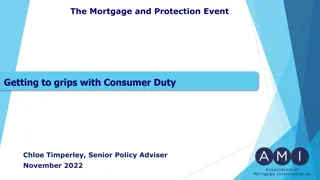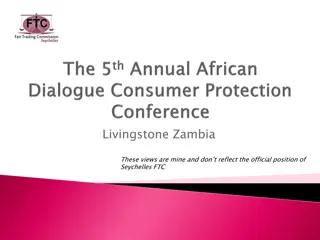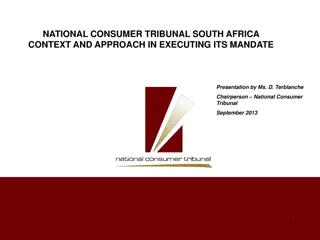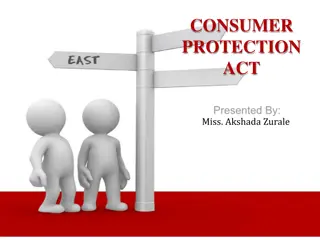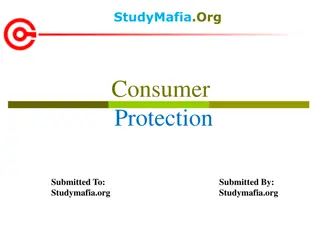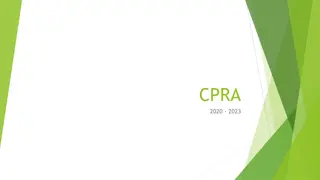Understanding Consumer Protection Laws in Ireland
Consumer protection laws in Ireland aim to safeguard consumers from unscrupulous practices, ensure their rights are upheld, and provide avenues for redress if needed. These laws are enforced by the courts, government agencies, and voluntary organizations. Understanding these laws is crucial for both consumers and businesses to promote fair and ethical practices in the marketplace.
Download Presentation

Please find below an Image/Link to download the presentation.
The content on the website is provided AS IS for your information and personal use only. It may not be sold, licensed, or shared on other websites without obtaining consent from the author. Download presentation by click this link. If you encounter any issues during the download, it is possible that the publisher has removed the file from their server.
E N D
Presentation Transcript
Chapter 25: Consumer Protection Consumer Laws
What I Will Learn To explain how consumers are protected in Ireland To discuss the laws that protect Irish consumers To understand why consumers need to be protected To explain how to get redress
Consumer Protection Activity Think-Pair-Share Think about the consumer rights and responsibilities you covered in the last chapter. Record what you remember in the record sheet. In pairs, choose the theme of Rights or Responsibilities . Design a poster on your topic and present it to the rest of the class. See Activity 25.1 in the TRB
Consumer Protection Consumer protection is necessary to: Stop unscrupulous manufacturers or retailers taking advantage of consumers Protect the rights of consumers Make sure consumers can get redress if their rights are abused
Consumer Protection (continued) Consumers are protected by: The law and the courts Government (statutory) agencies, e.g. the Competition and Consumer Protection Commission and the Ombudsman Voluntary Organisations, e.g. The Consumers Association of Ireland Unfortunately, the law cannot protect us from ourselves. If we buy on impulse, don t check prices or examine goods, or don t bother to read labels or instructions, we are likely to make many mistakes or bad buys.
Consumer Laws and the Courts Consumer rights are protected by legislation. These laws are necessary to prevent unscrupulous manufacturers and suppliers taking advantage of consumers, e.g. by misleading consumers about goods, services or price. They also ensure that if consumer rights are infringed, they have a means of redress. Many laws are passed by the state and the EU to protect the consumer. As many new situations arise when new products and services come on stream like credit cards and online shopping new laws have to provide for these.
Consumer Laws and the Courts (continued) The courts enforce consumer law, and claims up to 2,000 may be dealt with in the small claims procedure in the district courts. Higher claims are dealt with in the circuit court and high court, both of which are very expensive and time-consuming.
Sale of Goods and Supply of Services Act 1980 This Act states the basic rights of the consumer. When you buy a product or use a service, you are making a contract with the retailer or supplier. It does not have to be in writing: if you pay for a product and it is faulty, it is the seller, not the manufacturer, who has the legal obligation to put it right. Goods must be of merchantable quality (in good order and undamaged). It is important to consider what the product is meant to do, its durability and price. When you buy goods in a sale you have the same rights as when you pay full price for the goods.
Sale of Goods and Supply of Services Act 1980 (continued) Goods must be fit for the purpose intended, suitable for use and function as expected, e.g. electrical products must work safely and efficiently a dishwasher should wash dishes and food must be edible. Goods should be as described by the salesperson, on a label, in a brochure or in an advertisement, e.g. waterproof, genuine leather. If goods are sold on the basis of seeing a sample, they must correspond to sample on display, e.g. the paint in the tin should correspond to the colour shown on the outside of the tin.
Sale of Goods and Supply of Services Act 1980 (continued) Services should be provided by a skilled person, with due care and diligence, using quality materials. If goods do not comply with these conditions, the seller has broken the contract. Remember, once the product is of merchantable quality , fit for purpose and as described, you have no right to go looking for a refund or an exchange. If goods are clearly marked as seconds or have defects pointed out at the time of sale then you do not have any redress under the act. This also applies if you change your mind about a product.
Sale of Goods and Supply of Services Act 1980 (continued) This act also deals with notices in shops. It is an offence for notices such as the following to be displayed:
Guarantees The Sale of Goods and Supply of Services Act 1980 Act also deals with guarantees. Guarantees are legally binding. A guarantee or warranty on a product gives additional protection. It is a contract between the manufacturer and the consumer that indicates that the manufacturer will repair or replace an item within a set amount of time after it has been purchased.
Guarantees (continued) A guarantee must: Be legible Refer to a specific product Name the product and give the name and contact details of the person/company offering the guarantee Show the length of the guarantee from the date of purchase Outline how to make a claim Explain what the manufacturer will do what the customer should expect to receive in the event of a fault Identify any extra charges the claimant might pay for getting the product repaired (such as postage and packaging)
Which Products Have Guarantees? Products like household goods, e.g. pots/pans, furniture and electrical goods, typically come with a guarantee. Some services may also be guaranteed, e.g. work undertaken in a house (such as double glazed windows) may be guaranteed for a specific period of time.
Redress A consumer is entitled to redress or compensation for faulty goods or poor services. Under the act, consumers are entitled to complain. The type and amount of compensation depends on: How serious the fault is How soon after purchase the fault occurred How soon you complain Don t Forget! The sooner you return the goods, the stronger the case you will have. Do not use the product once you discover the fault, and do not attempt to repair it or you may lose your rights under this act.
Redress (continued) One of the following must be offered, provided that the product is returned with a receipt and has not been tampered with: Repair Replacement Refund or partial refund Compensation Credit note In the case of service, repeated without charge
Redress (continued) A consumer might be entitled to a full refund (money back) or replacement if goods are incapable from the start of doing what they are supposed to do, or if the goods are not as described (i.e. the consumer has been mislead). If you are not entitled to a full refund you may still get a partial refund if goods worked for a short time after purchase. The retailer might offer to repair the goods. Any repairs should be permanent and carried out quickly.
Redress (continued) A retailer can offer credit notes as a matter of goodwill if they feel you do not have a valid complaint, e.g. change of mind. A credit note is a note given to a consumer by a retailer for goods returned. It will state the value of the goods owed to the consumer.
What Redress? Suggest what redress, if any, you consider reasonable in each of the case studies you have been given and justify your choices. See Activity 25.3 in the TRB
Consumer Protection Act 2007 Protects the consumer against false or misleading claims about goods or services. It also forbids false or misleading information about the: i. Price ii. Previous price iii. Recommended retail price of goods or services Any extra costs should be stated on the price tag, i.e. if the price of a food mixer does not include all the attachments displayed, the extra cost must be clearly stated. If an item is priced now half price from 30 to 15, it must have been on sale at the original price for 28 consecutive days in the previous three months.
Consumer Protection Act 2007 (continued) Protects the consumer from false or misleading claims about goods or services either orally, e.g. from a sales assistant, or in advertising or catalogue descriptions For example, if a product is said to be guaranteed Irish, it must be produced in Ireland, or if a shop claims to open 24 hours a day , it must do so.
Examples of Claims Made Pure wool 100% cotton Made in Ireland Waterproof Free from artificial colours Bone china 18-carat gold Low fat High fibre Lowers cholesterol Real leather 24-hour service 1-hour photos Delivery to all areas Ireland s most punctual airline
Claims Activity Watch the YouTube video: 9 Brands Sued for False Advertising .
Claims Activity For homework, listen to a variety of TV or radio advertisements and make a note of claims made by suppliers of goods and services on the sheet you have been given. Feed the information back to the class. See Activity 25.4 in the TRB
Electronic Commerce Act 2000 Established under the EU. Protects consumers when shopping online. It states that e-bookings and agreements have the same status as written documents. The following transactions are exempt: Sale of land Concert tickets Home delivery of food and drinks Flight tickets Holiday bookings Auctions
When You Buy Online You Have the Right to: Clear and accurate information before you buy A refund if your goods are not delivered Return something because you change your mind Cancel a service Return something that is faulty Cancel digital purchases
Do You Know Your Consumer Laws? Think-Pair-Share Look at the scenarios you have been given. Read and answer the questions, justifying your answers with reference to consumer laws. Then discuss each scenario with the group. See Activity 25.5 in the TRB
Quick Revision 1. Explain why consumers need to be protected. 2. Name two consumer laws and explain how each protects the consumer.
